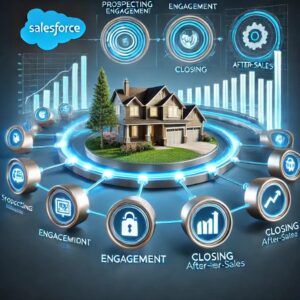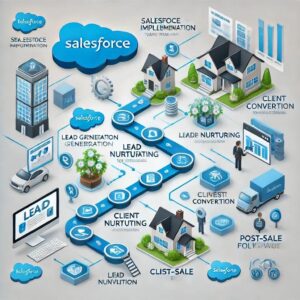
Success in the very competitive real estate market of today depends mostly on a good sales procedure. Leading CRM tool Salesforce is one of the best instruments available to assist to simplify and maximize this procedure. Effective salesforce planning and implementation will help real estate companies strengthen their sales pipeline, build client connections, and finally close more deals.
- Understand the Real Estate Sales Funnel
Understanding your real estate sales funnel is absolutely vital before starting Salesforce deployment. A sales funnel is the series of events a prospective customer passes through before deciding to buy. Usually, these levels comprise:
- Lead Generation: Finding possible buyers or sellers via several methods including referrals, social media, and internet adverts.
- Lead Qualification: Evaluating whether these leads are motivated going ahead and significant.
- Property Search and Showings: Prospects start searching at available homes once qualified.
- Negotiation and Closing: After finding a suitable property, the negotiation process begins, followed by closing the deal.
Knowing these phases will direct your Salesforce setup and enable you to create a customized solution fit for your clients and sales team.
2. Set Clear Goals for Your Salesforce Implementation
Before jumping into the technical details of Salesforce implementation, it’s important to define clear goals for your CRM system. Ask yourself:
- What are we hoping to achieve with Salesforce?
Do you want to automatically do tedious chores, simplify client correspondence, or better understand your sales performance? - What sales processes need automation?
Determine which areas of your sales process—contract creation, lead assignment, follow-up emails—could profit from automation. - How will we measure success?
Track the effectiveness of your implementation by means of important performance indicators (KPIs) including customer happiness, average response times, and lead conversion rates.

3. Choose the Right Salesforce Features for Real Estate
Customizable to fit a real estate sales funnel, Salesforce is a flexible CRM product with many capabilities. For the installation of a real estate sales funnel, few important aspects should be given top attention.
- Lead Management and Lead Scoring: Salesforce’s lead management capabilities track leads from your website and social media. Lead scoring highlights high-value leads so your sales team can focus on the best prospects.
- Opportunity Management: Salesforce’s tools for opportunity management track possible deals all through the sales process. From lead generation to closing, you may fit these phases to your real estate sales funnel.
- Customizable Dashboards: Create personalized dashboards that provide real-time insights into sales activities, lead statuses, and performance metrics. Your team can quickly see which deals are in the pipeline and what actions need to be taken.
- Marketing Automation: With Salesforce Marketing Cloud, you can automate email campaigns, lead nurturing workflows, and follow-up tasks. This is especially useful for sending property listings or promotions to qualified leads based on their interests.
- Customer Service and Case Management: Salesforce Service Cloud expedites client problems. The case management system addresses all client inquiries and builds your reputation with first-rate service.
- Mobile Access: Essential for real estate agents who are often on the road, Salesforce’s mobile app lets your sales team access customer data, update leads, and follow up on deals on-demand.
4. Collaborate with a Salesforce Development Team
Salesforce’s configuring and customizing can be challenging, particularly if you must fit it for a certain sector like real estate. Working along with a Salesforce development team guarantee.
- Customization of Salesforce Features: Customizing Salesforce’s lead scoring, pipeline management, and reporting tools to fit the particular requirements of your real estate sales funnel is something a development team can help with.
- Integration with Other Tools: To simplify data flow, Salesforce might be coupled with email marketing systems, property listing systems, and customer care tools.
- Data Migration: A Salesforce developer can help you migrate your data into Salesforce from another CRM system, therefore guaranteeing that no important customer or lead data is lost.
- Training and Support: Your salesforce development team can instruct fast users of the platform sales and support experts. They can offer ongoing assistance to maintain seamless operation of your system.
5. Implement Automation to Streamline the Sales Process
Many times, real estate sales teams are juggling several customers, homes, and offers simultaneously. Salesforce automation tools should be used to help one avoid the danger of missing crucial activities.
- Automated Follow-Ups: Create automated reminders for your sales staff to follow up with leads or clients following designated benchmarks, such a property show.
- Lead Nurturing Workflows: Create systems that distribute pertinent property listings or changes depending on lead preferences over time.
- Email Campaigns: Automate email campaigns saving time and guaranteeing constant communication by giving prospects timely updates on new properties or special offers.
- Task Automation: Automate daily chores include document distribution, meeting planning, or lead status updates to release your staff for more critical work.
6. Provide Training and Support for Your Sales Team
The team that implements Salesforce will determine how successful it is. Giving your sales force enough training guarantees they can leverage the possibilities of the platform.
Key training areas include:
- Navigating Salesforce: Make sure your staff understands Salesforce’s key capabilities—managing leads, opportunities, and accounts among other things.
- Customizing Dashboards: Share with your staff how to customize dashboards and reports to properly track their own sales performance.
- Using Automation Features: Show your staff how to configure and apply automated processes for task management, emails, and follow-up calls.
7. Measure Success and Continuously Optimize
Once your Salesforce Implementation for Real Estate Sales Funnel is live, it’s time to measure its effectiveness. Set KPIs such as:
- Lead Conversion Rates: Track the percentage of leads that move from one stage to the next in your funnel.
- Sales Cycle Time: Measure how long it takes to close a deal from initial contact to final sale.
- Customer Satisfaction: Collect feedback from clients to gauge the quality of service and identify areas for improvement.
Designing a good Sales cloud deployment for your real estate sales funnel calls for rigorous evaluation of your objectives, knowledge of your sales process, and choice of Salesforce capabilities. Salesforce can assist automatically run processes, track leads, improve communication, and finally close more deals with the correct strategy.
Working with a Salesforce Implementation for Real Estate Sales Funnel team, adapting the platform for your company needs, and offering appropriate training and support can help you to equip your real estate sales staff for success. To guarantee long-term success, never forget to keep evaluating your data and streamline your procedures.
